My editorial calendar suggested, to no one’s surprise, that I write about freedom or independence on this 4th of July. It didn’t take me too long to figure out that I should go straight to the expert.
Chris Guillebeau’s book, The $100 Startup, is all about freedom. See what I mean in this short interview.
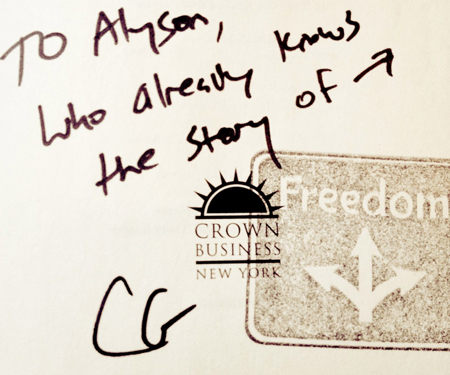
Alyson: In your book signings, you carry along a rubber stamp that says “Freedom” which you stamp on the page before signing. What do you mean when you talk about freedom? What does it mean, to you, to be free?
Chris: Freedom was the motivation mentioned by many of the people whose stories are told in The $100 Startup. A lot of people talked about how much they valued freedom, and how their new business had given them the freedom to set their own schedule and determine their own priorities.
Freedom is an underlying motivation for me too, but it doesn’t necessarily mean “working less.” To me it refers more to the concepts of opportunity and possibility. I can fill my time as I see fit, and much of the time I fill it with work I find meaningful. But the point is, the choice is up to me. That’s freedom.
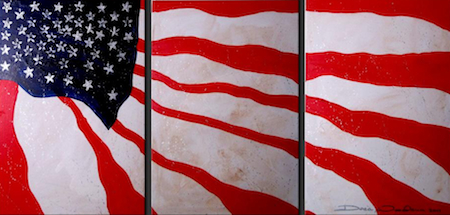
Alyson: Freedom was certainly a motivation for starting my business, but now I have to consider what is best for my artist-clients. Many of them are feeling the pressure to succeed with their art business. They might have a day job they’d like to shed, been tending to family, or been laid off in the recession. They don’t feel like they have much time.
Are there shortcuts to freedom?
Chris: Probably half of the case studies in the book began while working a day job, and in many ways, a day job can be beneficial. In addition to the obvious benefits of income and health insurance, if you have a busy work week and limited free time, you need to be more diligent about spending those limited hours on tasks that matter. You can’t spend your time surfing the Internet or messing around on something that doesn’t directly affect the success of the project.
I’m not a huge fan of shortcuts per se, but I do believe in simplification. Many of us have heard that “starting a business” or “being an entrepreneur” is a convoluted, mystical process. You hear that you have to write a 60-page business plan even though you have no idea whether the business idea in question will actually work.
On the other hand, The $100 Startup model is all about starting quickly (i.e., less than 30 days to market), not spending a lot of money, and focusing on the skills, resources, and contacts that you already have. I’m not sure it’s a shortcut, but it’s definitely a lot faster than the old way.
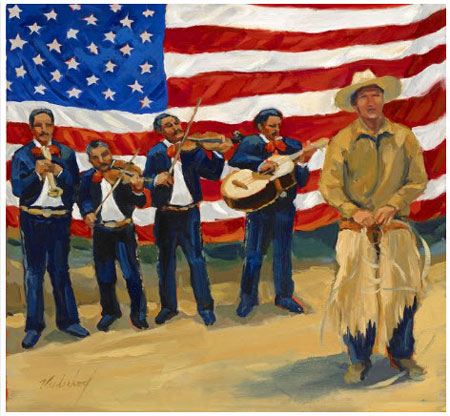
Alyson: Do we sacrifice anything when we seek the kind of freedom you’re talking about?
Chris: Sure. We sacrifice a routine and set of obligations dictated to us by someone else. In some ways, it’s nice and comforting to defer our security and routine to an external party like a boss. Fortunately, many people soon realize that this is a false comfort, and that’s when they yearn for something different.
Alyson: Finally, I know a lot of people feel tied to responsibilities. They have kids to raise, elderly parents to care for, or debt to pay off. Or, as is often the case, they have a spouse who isn’t buying into the concept.
Is freedom still within their reach? Can they do anything right now to put them on the path to freedom?
Chris: Those things are all real. They matter. So to begin, I’d never suggest that anyone quit their job right away with no kind of safety net.
At the same time, these responsibilities can also lead to paralysis, especially when the person can’t imagine any other kind of existence. Some of the case studies from the book came from people who had been forced into making decisions quickly, often because of a job loss or big personal change. But in some ways, the other stories—those who took action even though they didn’t necessarily have to right away—are more inspiring. Numerous people talked about creating a side project that produced more than $50,000 a year in income, even as they spent most of their working week at the day job.
So yes, I believe that freedom is within the reach of most of your readers. I’d suggest focusing as much as possible on how they can help people. Yes, follow your passion, but do so in a useful way. Fo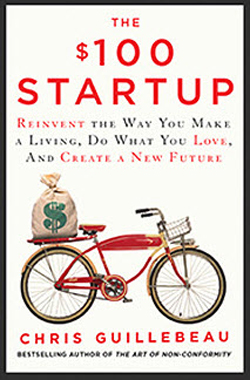 cus on what you can offer, and how you can make a real difference in someone’s life. A lot of business models were built in exactly this manner.
cus on what you can offer, and how you can make a real difference in someone’s life. A lot of business models were built in exactly this manner.
Happy Independence Day!
Chris Guillebeau is the author of The $100 Startup and has a truly inspirational blog at The Art of Non-Conformity.
Freedom To Be an Artist
- Alyson Stanfield
Share this post

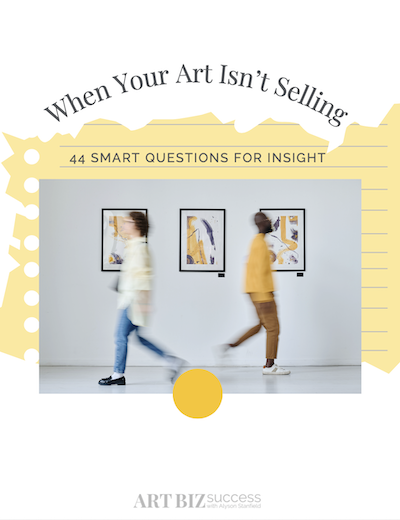

17 thoughts on “Freedom To Be an Artist”
“Yes, follow your passion, but do so in a useful way.”
Excellent. Advice ignores this important “but” all too often. There are multiple ways to follow your passion, so choose a good one. Great interview!
Agreed, Julie! And “follow your passion” is something you really won’t hear me say much – if at all.
Loved this post, Alyson………. I went to Chris’ blog and found it to be very refreshing! Thank you and Happy Independence Day!
It is that, Holly. I think you’ll enjoy following Chris.
What a great post, so many helpful thoughts. Thank you!
Thanks, Bren. You should definitely check out Chris’s blog.
Great interview Alyson! I’m a huge CG fan. =)
Have fun at the World Domination Summit!
Thanks, Stephanie!
That will be a fun gathering in Portland, Alyson. The $100 Startup by Chris is an inspiring book. Those who read it should have a pad of sticky notes close by to write down all the ideas as they pop into your head. I was so pleased to see that you were one of those profiled in his book.
Thank you, Paula! I’m glad you enjoyed the book. What story do you think was most inspirational?
Great questions Alyson, I especially like the one about giving up your day job and also the responsibilities of life a fine line between paralysis and living your purpose and dream. It is a two edged sword a lot of have to walk on, it takes great balance and a smart use of time. And thank you Alsyon.
I found the interview to be interesting. His perspective is quite clear to him and I believe clarity is imperative for success. The only disappointment was his gliding right over the added difficulty of being a caregiver. I suspect this is because he has no experience or understanding of this. Most people have no idea how many of us caregivers are unable to work (a few of us work part time while our care recipient has a sitter or day care) while caregiving. The outside income isn’t there to rely on. I personally find it more inspiring to know there are those who are able to succeed and stay sane and still take care of the caregiving tasks AND deal with the emotional upheavals and turmoils than I do for someone who simply makes a change in their thinking and acts.
On the other hand, being a family primary caregiver can also teach that everything doesn’t have to be done NOW. Or even at the speed we’d like things to go. I think that once I’m a success financially I will feel very able to help other caregivers get there too.
Patricia: Obviously caregiving is not what this interview was about, but it is something that needs to be considered – not by Chris but by someone who knows of the experience.
Especially loved this post and the link to Chris’ blog. Loads of new ideas. I appreciate your broad range of subjects —and as always a fan of yours. -Rebecca
Great interview, Alyson! You bolded it but I’m going to repeat it because it resonates so, “I’d suggest focusing as much as possible on how they can help people.” This seems to be what is so different about CG’s model and what is at the heart of the businesses that he featured in the book, yours included! Enjoy the WDS!
Freedom as an artist, for me is get up each day, and say what creative thing can I do today? My art life is so good , I don’t believe it my self sometimes.
I am of the Carpe Diem school of thought, be, do what you want now.
Freedom as an artist or creative person is what ever one wants it to be.
Great interview! I guess freedom is the word for me today 🙂 All the best to everyone here.